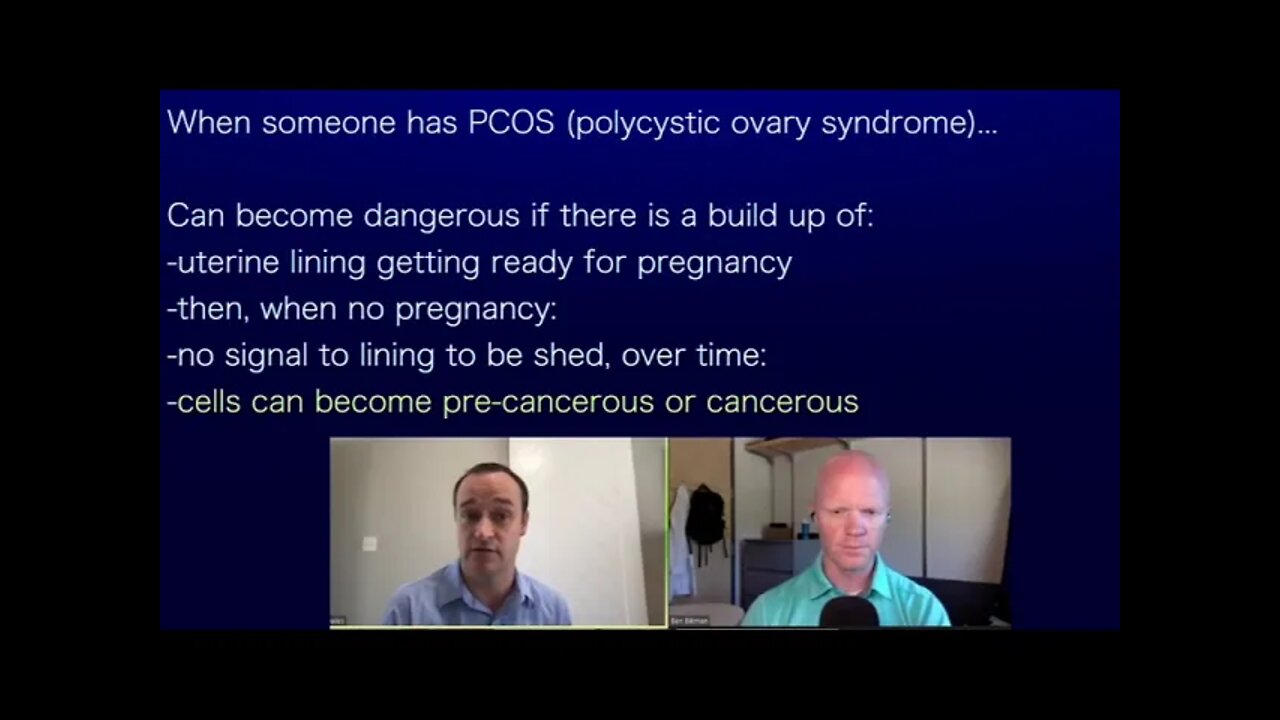Premium Only Content

Ben Bikman: PCOS 3: Unovulated follicles, prevented from dissolving, can become dangerous cysts
With Dr Steve Cole.
InsulinIQ.com Youtube podcast June 29, 2021
The Metabolic Classroom
InsulinIQ.com
Normally a patient develops one dominant follicle...
which ovulates and becomes the corpus luteum, that
continues the pregnancy until sees an HCG level
(a pregnancy hormone)
and the process continues
Corpus luteum:
-yellow hormone-secreting body in female reproductive system
-formed in an ovary at follicle that has ovulated
-produces estrogens & progesterone
HCG (human chorionic gonadotropin) hormone:
-produced by cells surrounding a growing embryo
-this eventually forms the placenta
-can be detected as early as 1 week after fertilization
Normally a patient develops one dominant follicle...
the other follicles should:
-go through apoptosis (programmed cell death)
-body dissolves them
-corpus luteum (egg sac remnant) also dissolves
When someone has PCOS (polycystic ovary syndrome)...
-don't have regular menstruation, it is because:
-they don't ovulate regularly
-it is the cause of oligomenorrhea (infrequent menstruation)
-not releasing the egg & setting off cascade of hormones:
-in order to:
-lead to pregnancy or toward having a period
When someone has PCOS (polycystic ovary syndrome)...
Can become dangerous if there is a build up of:
-uterine lining getting ready for pregnancy
-then, when no pregnancy:
-no signal to lining to be shed, over time:
-cells can become pre-cancerous or cancerous
When someone has PCOS (poly cystic ovary syndrome)...
Doctors are always cognizant of this danger.
It is because they don't ovulate & have cascade of hormones
(often caused by insulin resistance)
When one follicle ovulates, all the others normally are
destroyed through apoptosis, but
in the absence of ovulation, these just "stick around"
-become the cysts in PCOS
and the unovulated, dominant follicles stay as well
Normally an ovary is smaller than a typical egg...
but, a cystic ovary can be the size of a kidney
-due to the cystic follicles taking up so much space
-people can feel this larger ovary
-can be painful when cyst ruptures
-
 4:04
4:04
Doctors To Trust
1 year agoSTEPHEN PHINNEY c | STATINS: no clinical difference in mortality, but RAISE DIABETES RISK
1.43K1 -
 38:57
38:57
Rethinking the Dollar
48 minutes agoWednesday Morning Check-In | Trump's Actions Are Driving Destroying The Dollar
1 -
 15:36
15:36
Dr David Jockers
1 hour agoWhat's the Dark Side of Eggs That No One Talks About?
361 -
 38:35
38:35
BonginoReport
5 hours agoTrump is Conquering a Foreign Land and It’s Not Greenland (Ep.133) - 02/05/2025
81.5K192 -
 LIVE
LIVE
Wendy Bell Radio
6 hours agoTaking Out The Trash
11,924 watching -
 1:22:24
1:22:24
Graham Allen
4 hours agoDems Try To RAID USAID Office!! + Trump Meets With Netanyahu In The Oval Office! Peace Is HERE!!
40.2K42 -
 1:01:16
1:01:16
Randi Hipper
1 hour agoGROUNDBREAKING CRYPTO BILL INTRODUCED! WHAT THIS MEANS FOR BITCOIN INVESTORS
9.32K1 -
 LIVE
LIVE
Vigilant News Network
15 hours agoRFK Jr. Clears Major Hurdle for HHS Secretary | The Daily Dose
837 watching -
 1:28:24
1:28:24
Game On!
16 hours ago $0.61 earnedTom Brady's SHOCKING Super Bowl Pick!
30.9K2 -
 1:12:24
1:12:24
Jeff Ahern
3 hours ago $0.08 earnedNever Woke Wednesday with Jeff Ahern (6am Pacific)
41.4K7